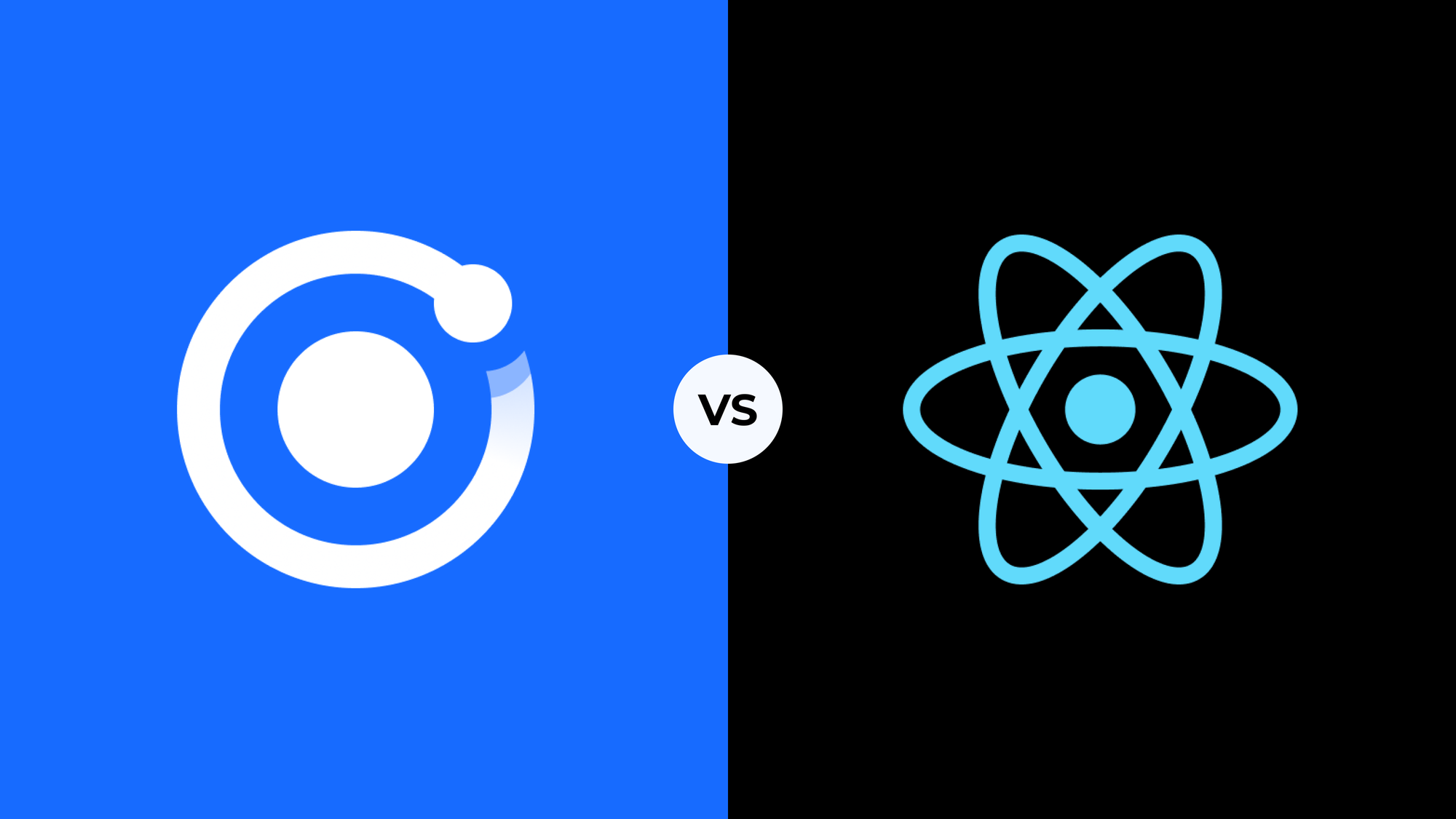React Native vs Ionic: Choosing The Best Mobile Framework

Choosing the right framework is critical to the success of the business in mobile app development. The two main contenders in this space are React Native and Ionic. Both frameworks offer unique benefits and features, making the comparison between React vs Ionic a key consideration for developers and projects This comprehensive guide will explore the differences between React Native and Ionic, their benefits, features, and similarities, to help you make the right decisions for your mobile app development needs.
React Native
React Native is an open-source mobile application development framework developed by Facebook. It allows developers to create mobile apps using JavaScript and React, a popular library for creating user interfaces. The system has gained a lot of traction, and has led many companies to hire React Native developers for their mobile projects.
Ionic
Ionic is an open source framework for building cross-platform mobile applications using HTML, CSS, and JavaScript web technologies. After its release in 2013, Ionic gained popularity among developers due to its ease of use and vast library of pre-built features.
Advantages of React Native app development
1. Native Performance: React Native compiles native code, resulting in near-native performance for apps built in this framework.
2. Large Communities and Corporate Support: With the support of Facebook and a large team of developers, React Native benefits from a wealth of continuous development and resources.
3. Code Reusability: A significant portion of the codebase can be shared between iOS and Android platforms, reducing development time and effort.
4. Hot Reloading: This feature allows developers to see changes in real-time without losing the state of the application, enhancing the development experience.
5. Accessing Native Modules: React Native provides easy access to platform-specific APIs and the ability to write native modules when needed.
6. Powerful Performance Efficiency: React Native's design allows for efficient memory usage and intuitive animation, which helps the entire app work.
Advantages of the Ionic framework
1. Cross-Platform Development: One of the main advantages of choosing the Ionic framework is that you can develop apps that work on multiple platforms using a single code base this greatly reduces development time and costs.
2. Web Technology-Based: Ionic uses well-known web technologies, making it easy for web developers to transition into mobile app development without learning a completely new programming language
3. Large communities: With a strong developer base and a wide range of plugins and extensions, Ionic offers developers comprehensive support and features
4. Cost-effectiveness: The ability to reuse code across platforms and the use of web technologies helps reduce development costs compared to native app development
5. Rapid prototyping: Ionic’s prebuilt components and easy-to-use CLI (Command Line Interface) allow developers to quickly create prototypes and iterate designs
6. Progressive Web App (PWA) Support: Ionic excels at creating PWAs, enabling developers to create web applications that work like native apps on mobile devices.
Features of React Native
- Developers can use their existing JavaScript skills to build mobile apps, reducing the barrier to entry for web developers.
- React Native uses native UI components, giving it a more authentic look and feel compared to a hybrid framework.
- The framework uses Flexbox for responsive design, making it easy to develop apps that perform well on a variety of screen sizes.
- There are many third-party plugins to extend the functionality of React Native apps.
- React Native allows developers to push updates to users’ devices without going through the App Store review process.
- React Native enables developers to write platform-specific code when needed, and provides flexibility for customization.
Features of Ionic
- Ionic offers complex pre-built UI components that can be easily customized to fit your application’s design needs.
- Using Cordova or Capacitor plugins, Ionic apps can access native device features such as camera, GPS and push notifications.
- While Ionic can be used with JavaScript frameworks, it has particularly strong integration with Angular, providing a powerful interface for building complex applications.
- The Ionic automatically optimizes the look and feel of content to match the native platform, ensuring a consistent user experience across devices.
- The live reload feature enables developers to see changes in real-time during coding, speeding up the development process.
- The Ionic DevApp tool enables developers to test their apps on real devices without the need for complicated programming.
React Native vs Ionic: The Similarities
While React Native and Ionic have distinct approaches to mobile app development, they share some similarities:
- Both allow developers to build apps for multiple platforms using the same codebase, albeit in different ways.
- Both React Native and Ionic use JavaScript as their primary programming language, making it accessible to web developers.
- Both systems benefit from an active developer team, offering numerous features, plugins, and support.
- Both React Native and Ionic are open source projects, allowing developers to contribute their own development and make changes as needed.
- Both frameworks provide ways to access native device attributes, although their approaches differ.
- Both React Native and Ionic use a component-based approach to build user interfaces, promoting code reusability and maintainability.
Suggested Reads- Angular vs React vs Vue in 2024
Ionic vs React Native: Which is better?
The choice between Ionic and React Native depends on various factors, including project requirements, developer expertise, and performance needs. Let's explore some key differences to help you make an informed decision:
1.Performance:
React Native tends to offer better performance than Ionic, especially for complex applications. This is because React Native compiles to native code, while Ionic runs in a WebView, which can slow down performance in some cases. The React Native vs Ionic performance difference is especially noticeable in apps with complex animations or heavy data. React Native's bridge mechanism allows efficient communication between JavaScript and native components, further enhancing performance.
2. Learning style:
Ionic has a gentler learning curve for web developers due to its use of familiar web technologies. React Native requires learning React and platform-specific concepts, making it initially more challenging for those without React experience. However, developers already familiar with React find the transition to React Native relatively easy. The learning curve for each framework largely depends on the developer's existing skill set. Ultimately, both frameworks are accessible with dedicated learning and practice.
3. UI Features:
Ionic offers several pre-built UI components that adapt to the look and feel of the platform. React Native uses native UI components, which may require more customization but results in a more realistic native look. This difference in UI style is a key consideration in the Ionic vs React Native debate.
4. Accelerated Growth:
Ionic typically allows for faster development, especially for simple applications, thanks to its large library of pre-built products using web technologies. React Native may require more time for configuration and configuration but can produce robust, high-performance applications faster.
5. Native functionality:
While both frameworks allow access to native device features, React Native offers more direct integration with native modules, which can be useful for apps that need to make greater use of platform-specific APIs
6. Code Reusability:
Ionic allows high-level code reuse across platforms in general, as it uses web technology that works consistently across devices. React Native can require a lot of platform specific code, especially for complex UI elements.
7. App size:
Compared to React Native apps, Ionic apps are larger in size, as they encompass the entire web runtime. This may be worth considering for users with limited storage space.
8. Updates and Maintenance:
Ionic applications can be updated quickly using web technologies, while React Native applications may need to be updated more frequently to accommodate changes to native platforms
9. Ecosystem and third-party libraries:
Both frameworks have extensive ecosystems, but the close compatibility between React Native and native development tends to result in a wide range of high-quality, platform-specific libraries and tools
React Native vs Ionic: Which one should you choose?
Deciding between React Native and Ionic depends on the needs and constraints of your specific project. Here are some guidelines for choosing:
Choose Ionic if:
1. You have a team with strong web development skills and you want to leverage those skills.
2. You’re building a very simple app that doesn’t need native features that work well.
3. Rapid prototyping and fast time to market are key.
4. You want to maximize code reuse across platforms.
5. Your main app is content display and basic interaction.
6. You are interested in developing Progressive Web Apps along with mobile apps.
Choose React Native if:
1. You need near-native performance for complex, feature-rich applications.
2. Your team has experience with React or is willing to invest time to learn it.
3. You need more platform-specific APIs and native modules.
4. You want a more authentic native look and feel for your app.
5. You create an app that will be maintained and updated over time.
6. You plan to hire React Native developers or develop React Native skills.
After all, both React Native and Ionic are powerful frameworks with their own strengths. The best choice depends on the specific needs of your project, the expertise of your team, and your long-term growth goals.
F22 Labs and React Native Development Services
When it comes to professional React Native development, F22 Labs stands out as a leading service provider. With a team of experienced React Native developers, F22 Labs offers comprehensive mobile app development solutions tailored to meet a variety of business needs. Their expertise in React Native allows them to build high-performance, cross-platform applications that deliver a native user experience.
By choosing to hire React Native developers from F22 Labs, businesses benefit from an experienced team of up-to-date React Native advancements and best practices. This ensures that your mobile app implementation leverages the full capabilities of the React Native framework while meeting industry standards and performance metrics.
Conclusion
In conclusion, comparing React Native and Ionic reveals two powerful frameworks with unique approaches to mobile app development. The differences between the React Native and Ionic frameworks are significant, especially in terms of functionality, development process, and resulting user experience.
When choosing between Ionic and React Native, consider factors such as your team’s expertise, project needs, performance requirements, and long-term maintenance schedules. The React Native vs Ionic performance gap can be significant for complex applications, while Ionic’s ease of use and rapid development capabilities may be more suitable for simple projects
Ultimately, whether you lean towards choosing the Ionic framework or opting for React Native, both offer robust solutions for mobile app development. By carefully analyzing the differences between React Native and Ionic and aligning them with your project goals, you can make informed decisions that will put your mobile app development project on the path to success.
Frequently Asked Questions
1. Which is best React Native or Ionic?
It depends on project needs; React Native for native-like apps, Ionic for web-based.
2. Is React Native still worth it?
Yes, it's still popular and effective for cross-platform mobile development.
3. Is React Native the same as ReactJS?
No, React Native is for mobile apps, ReactJS is for web interfaces.
